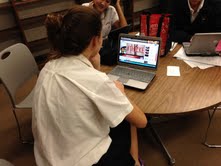
Every time I get in my car, I am pretty much guaranteed to hear “Blurred Lines” by Robin Thicke, featuring T.I. & Pharrell Williams blaring from my radio. At first listen it sounds like a fun catchy song, but when I took the time to look up the lyrics and music video, I was appalled by what I found.
The song is about liberating a “good girl” and giving her what she supposedly ‘wants’, even though she is conveniently not asking for it. Thicke implies this with the lyrics, “I know you want it”, claiming that when women say ‘no’, they don’t really mean it.
Depending on whether or not you watch the unrated version, the music video features either naked or scantily clad women parading around three fully dressed men. If that isn’t an immediate sign of the misogyny inherent in this song, then it becomes apparent when the women are placed on the same level as animals, and even inanimate objects.
In an interview with GQ, Thicke talked about the music video and his reasoning behind the design.
“We tried to do everything that was taboo. Bestiality, drug injections, and everything that is completely derogatory towards women,” said Thicke. “Because all three of us are happily married with children, we were like, ‘We’re the perfect guys to make fun of this.'”
Defenders of Thicke’s song argue that the song and video are an anthem of women-empowerment, and Thicke himself might believe he is making fun of sexism in America. However, the fact of the matter is that women ARE NOT fully empowered in this country.
The music video cannot be considered ironic because violence and sexual assault against women remain major issues. According to RAINN (Rape, Abuse, and Incest National Network) 207, 754 Americans are sexually assaulted every year, and yet rape is the least reported crime in America and 97% of rapists will never spend a day in jail.
One possible reason behind this major flaw in our judicial system is that songs and media pieces like “Blurred Lines”, belittle the problems of sexual assault. This trivialization of the victims’ and their struggle may make judges more apt to dismiss rape and harrassment cases.
When asked whether or not the video was degrading towards women, Thicke said, “Of course it is. What a pleasure it is to degrade a woman. I’ve never gotten to do that before. I’ve always respected women.”
So according to Thick, it is not only okay to degrade women, but it is also a “pleasure”?
Not only is “Blurred Lines” constantly playing on the radio, but according to Uproxx Music, it has topped the Hot 100 Billboard charts for 14 weeks straight, bringing it close to becoming the most popular song of all time. This fact should be a wake up call to our country, etting us know that sexism is still a prevalent issue.
As young women, it is important for us to acknowledge that this type of media is destructive and takes away our voice to stand up for ourselves. At some point in our lives every single one of us will likely be affected by sexual prejudice or assault and the first step to protecting ourselves is acknowledging the importance and relevance of this issue. We should see this kind of offensive song as unacceptable, and our decision to remain silent or speak up on this topic will shape the society that we will one day have to live in on our own.
The message that needs to be conveyed here is that the line between yes and no is in no way under interpretation, and more importantly there is nothing “blurred” about consent.

